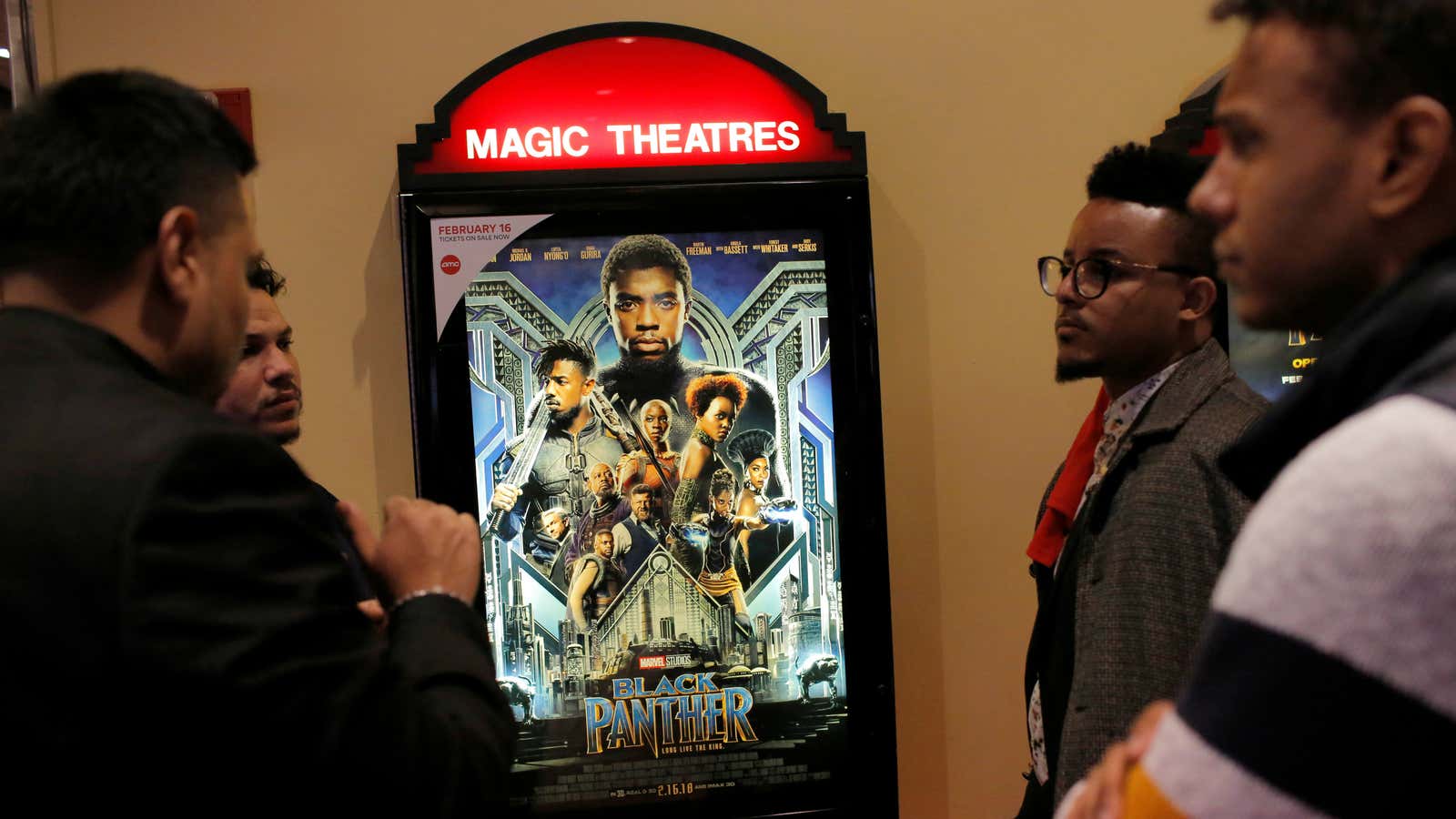The following conversation (which contains more than a few spoilers) took place in a Slack channel for Quartz Africa correspondents, Abdi Latif Dahir in Nairobi, Yomi Kazeem in Lagos and Lynsey Chutel in Johannesburg.
Abdi Latif Dahir: This might sound very hyperbolic but I have never been more proud of being black and African. That movie was lit and amazing.
Yomi Kazeem: I enjoyed it a LOT. Very graphic and colorful. The wife says we’re going back to watch it at least two more times. There’s a mad rush right now, so maybe this weekend. Movie sold out all of today as early as the morning. On a Monday. I don’t know if a lot of people are taking days off to see it or if there are just too many unemployed people.
Abdi: I was too psyched about it. I wore a designer dashiki shirt that I received as a gift from my sister in Ghana. But I think I was the least dressed in the cinema. One of my friends wore a full-on black cloak embroidered with yellow threadings and looked like this traditional African king.
Yomi: I was gonna wear a grand dashiki as well, but I ended up wearing a regular shirt and pants. Good thing too because, even though there was lots of talk about showing up in all kinds of traditional clothes, no-one did at the screening I was at. I would have looked like Eddie Murphy fresh out of Zamunda when he first landed in New York.
Abdi: Haha. People looked very elegant and fiery at the cinema, almost like Grace Jones in the 1980s. And speaking of Jones, it was interesting when the two warrior princesses from Wakanda showed up at the Los Angeles apartment and Zuri said, “It’s these two Grace Jones-looking chicks.”
Yomi: “Don’t scare me like that, you colonizer.”
Abdi: I really liked princess Shuri’s character. Like when agent Ross was brought in wounded and she said, “Great, another broken white boy for us to fix.”
Yomi: My one annoyance with Black Panther is why did a white dude end up saving the day? I’ve seen that a billion times already. Am I overthinking it?
Abdi: Question is: why was he there in the first place? I was kind of happy when they got rid of the first South African arms dealer, only to realize this other one was already being revealed into the secrets of Vibranium and Wakanda.
Lynsey Chutel in Johannesburg joins in
Lynsey Chutel: Whooooaaaaaahhhh! I completely missed all of this. I saw a late 11pm show on Saturday and even that was packed with people dressing up in their best Wakandan gear. The film was sold out for most of the weekend, and judging by the Instagram posts, almost everyone dressed up. I’ve also never seen people take selfies with a video poster before—there was a little line before and after the movie of people posing against the photo. And my people clapped in the film—maybe it was the IMAX effect.
On the white characters in the film, so problematic that the good guy is an American CIA agent, like the CIA has such a stellar reputation helping African regimes.🙄 Also, interesting that Klaue is a white South African mercenary—probably trained under apartheid. I think that was a very deliberate choice, would have liked to know more. Also, does this mean white South African mercenaries are becoming a new genre of mercenary? I’m thinking Elysium, the Manchurian Candidate.
Oh, and Abdi, Shuri is hilarious, really lifts the film from becoming too heavy, like when she says all “When you said you would take me to California for the first time, I thought you meant Coachella.”
And how is it that she gets all that work done while listening to Gqom and Durban house music at full blast in her lab?
Abdi: Or when she said, “This corset is really uncomfortable so can we all wrap this up and go home?”
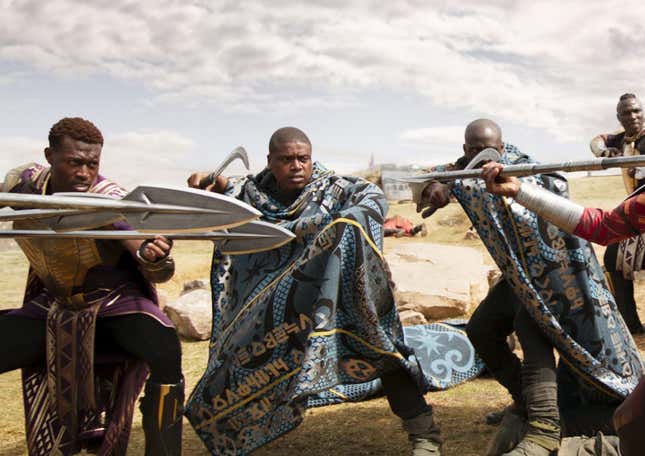
Yomi: That’s funny! But, wait, what’s Wakanda’s economic model? No international trade? Do they make all that they need? No imports/exports?
Abdi: Those markets where the Ethiopian music was playing looked very basic too, right? Even though the city looked high-tech from above.
Lynsey: I kinda liked how chaotic downtown Wakanda seemed. Maybe I’m wrong, but that kinda makes it feel a little more African. It felt like it could have been downtown Jo’burg or anywhere, but perhaps I should expect more of our cities.
Yomi: The cities were threadbare. Who were all those fancy trains for? If they showed mad tech advancement inside their homes and for everyday Wakandans, it’d have been great. I only saw one scene where a regular Wakandan had one of those tech beads and was using it. Otherwise, felt like all the great tech was for the royal family and weapons.
[protected-iframe id=”c4471c04a7d02d4948923969ca761652-39587363-107827707″ info=”https://giphy.com/embed/co6rrZDEPrtVC” width=”480″ height=”270″ frameborder=”0″ class=”giphy-embed” allowfullscreen=””]
Lynsey: True, Yomi. It’s weird the tech doesn’t seem to be integrated into the everyday lives of Wakandans, but then again tech advancements don’t make humans any less messy. I always think about how science fiction from 30 years ago assumed that once we had video calling, humans would also somehow have evolved and transcended our social ills, but we now know that having a smartphone doesn’t create an equal society. I think that was a missed opportunity on the part of the film, if you have this amazing tech, surely it should have gone beyond mining and weapons?
Abdi: There was definitely power politics at play—it was mostly princess Shuri who knew and controlled the system of knowledge.
Yomi: Yep. Sort of like how African dictators keep the best for themselves.
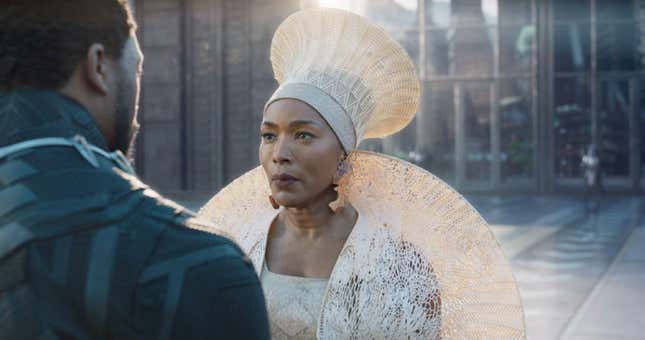
Lynsey: On Wakanda’s political economy, fair point, I hadn’t thought much about how much the family is clearly controlling everything in Wakanda, and it makes sense why the Jabari tribe is angry (also, I liked their tribe). The film is great on gender balance, but it it does say something about how much power is vested in tradition and the elders.
Lynsey: Also, can I say that as an African woman and a “dutiful daughter,” I was like, of course, his mother, sister, and girlfriend had to come and save him, and then he takes the credit 😒 Okay, rant over.
Yomi: Hahahaha! Love it!
Abdi: Haha. Of course, he took the credit, Lynsey. But I was also very much amazed at how strong and independent the women in the movie were.
Lynsey: On the women: I don’t know what it’s like in other countries but that’s very much the way it works here, women get things done, deal with crises, make sure everything works, and a man swoops in, does some arbitrary heavy-lifting and gets all the credit. It’s practically expected that it’s the way family gatherings and everything else should work and in South Africa, it’s pretty much across races and ethnicity.
Yomi: I think of it within the context of families and households and I agree. Hard to say that reflects in political spaces because men are way more dominant by virtue of outnumbering women.
Abdi: In the chaos of Somalia, women really hold society together. A lot of fathers and men died fighting during the war, and many businesses in Mogadishu and beyond (selling khat, fuel, manning shops and farms, herding goats and sheep) was and still is being done by women.
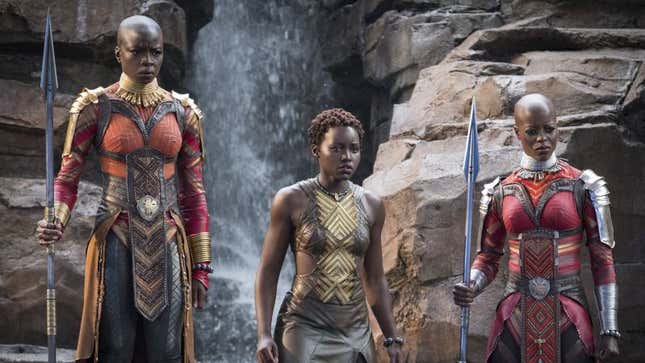
Lynsey: Complaints about T’Challa being a bit of a Momma’s boy aside, I think the film’s gender roles were almost revolutionary. Okoye is hands down my favorite character and she was able to be strong and gentle at the same time. Thinking about that scene where she greets T’Challa and Daniel Kaluuya’s character W’Kabi and how her face softens between “My king, my love” (Which in a hindsight was a precursor to having to choose between her job and her boo, but which ambitious woman hasn’t had to make that decision in some form). For a black female character, there was so much nuance in that moment, a nuance that few films allow. I’m so excited that my young nieces have the Dora Milaje to imitate. Also, shoutout to Ruth Carter for practical fighting gear for women, including when Okoye rips off her wig in the Korean casino scene, after she’s been complaining about it anyway: “I want you to get this ridiculous thing off my head.”
I can’t help but compare them to Wonder Woman, who wandered through her film baffled by the modern world and needed a guy to help her figure it out and then went to battle, in freezing Europe, in a tiny skirt. Guuuurl! As someone from a tropical country, how on earth did that make sense, Amazon or not. But yes, back to Black Panther, let us not forget that T’Challa lived because the women in his life had a plan.
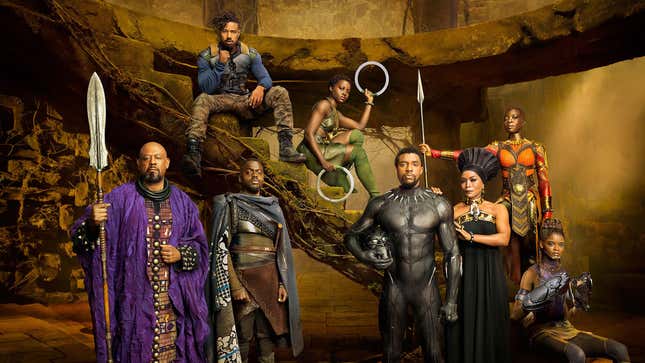
Yomi: Okay, thoughts on Killmonger’s motives and ambitions? The chasing the idea of “global black liberation.”
Lynsey: I actually agreed with Killmonger, I understood where his anger was coming from. And that isolation he spoke about, about being an outsider in Wakanda, I’ve heard African Americans talk about that feeling when coming to Africa. It’s why when Killmonger says “Hi Auntie,” when he enters the throne room, it’s not just a joke, it’s about a lost connection. It’s also what makes that Killmonger quote at the end so powerful: “Bury me in the ocean with my ancestors who jumped from ships, ‘cause they knew death was better than bondage.”
Also, unless I’m mistaken, did they actually ever say “Africa” in the film? Or it was just referred to as an idea?
Yomi: I never heard Africa, now that I think about it. How did you feel about that idea of liberation being painted as wrong though? I suppose it was his plan to “enslave the oppressors” more than the plan to “free the oppressed” that was villainy.
Abdi: I actually was attracted—to an extent—to his ideas about liberating the oppressed. I mean, imagine having all those powers and watching the type of horrors that befell those who were stolen from the African continent? But then, the way he was going about his vision was chaotic. I mean disseminating Vibranium would never have brought any more peace than Kalashnikovs have for us. As Shuri said, “Guns: So primitive!”
Yomi: Yup. Shout-out to Lupita’s character Nakia for seeing that all that tech advancement and riches could benefit others rather than remain holed up in Wakanda. Looking forward to sequels when she’s queen!
Black Panther: “If you are not so stubborn, you would make a great queen.”
Nakia: “I would make a great queen because I am stubborn—if, if that’s what I wanted.”
Lynsey: Can we turn our “watercooler chat” into a post?
Yomi: I think so….Totally Quartzy.
Abdi: “Wakanda Forever.”
The end…for now. Until we all go see it again. And again.
These exchanges were edited slightly for length and clarity.
